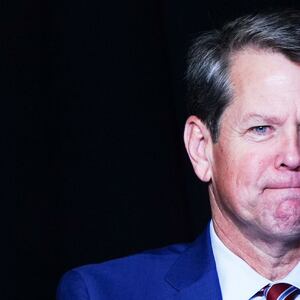NEW ORLEANS—About an hour before Vice President Mike Pence touched down in Baton Rouge last Tuesday, the state’s attorney general, Jeff Landry, sent out an inter-office email.
“Out of an overabundance of caution with the Vice President coming to our state, I was tested for coronavirus,” he wrote. “Though experiencing no symptoms, I tested positive for COVID-19.”
The notion that Landry, a conservative firebrand who has repeatedly spoken out against Democratic Gov. John Bel Edwards’ mask mandate, only decided to get tested because of Pence’s planned visit didn’t entirely add up. Landry’s wife had also tested positive several days prior, according to sources familiar with the situation. According to Landry campaign spokesperson Brent Littlefield, Pence’s visit was definitely something the attorney general considered when deciding to get tested, but he did not deny that family played a role in the decision.
Days before Pence came to town, Landry took two different tests, both within 24 hours of one another, Littlefield explained. A blood test, he argued, ruled out the suggestions on social media that the attorney general had contracted the virus over the Fourth of July holiday, which he celebrated with his family near Cypremort Point State Park in Vermilion Bay, an inlet of the Gulf of Mexico about 40 miles south of his home in Broussard. It’s also where the Iberia Rod and Gun Club hosted its 67th annual fishing rodeo, despite the forecast of rain with a chance of coronavirus.
But even as he makes a name for himself nationally as a conservative rebel against his governor’s mask mandate, Landry’s office at the Louisiana Department of Justice requires mask use.
In many ways, the attorney general’s shifting stance on coronavirus is illustrative of why Louisiana has struggled to contain the virus, according to conversations with elected officials, public health experts, and residents in the state. For nearly three weeks, Louisiana, one of the places hit hardest in the early days of the pandemic, has been confronting a surge in infections statewide. But this time, the crisis has moved out of the big cities and into the heart of Cajun Country and the rolling piney hills of north Louisiana.
In April, the racial disparities were shocking: 70 percent of those who died from COVID in Louisiana were Black, and to rural and suburban whites—and the Republican legislators who represented them in Baton Rouge—a lockdown was superfluous. The pandemic was out of sight, out of mind.
Today, however, as the death toll continues to mount—COVID has so far killed nearly three times as many Louisianans as were lost in Hurricane Katrina—the racial breakdown is closer to 50-50.
“We now have enough data to know that the new wave of cases began around July 1st,” said Lee Lemond, an environmental scientist who has been crunching the numbers from the state Department of Health and providing the public with easy-to-read histograms and charts through the website LouisianaCoronavirusData.org. “But what’s troubling is that unlike what we experienced in New Orleans in early April, the growth appears to be more gradual and sustained in Acadiana and northwest Louisiana.”
That makes it more challenging to make predictions on when or if the number of new cases will ever peak and then plummet as they did in New Orleans. Lemond, who worked for the state’s Department of Environmental Quality before deciding to launch his own consulting company, cautioned that his opinions were based solely on the trend lines and the data provided daily by the state Department of Health.
One thing is clear, however: The virus now poses a much greater risk to those living outside of the Crescent City, where Mayor LaToya Cantrell’s early decision to enforce a stay-at-home order—her preemptive cancellation of upcoming festivals and parades were the subject of intense controversy in April—has proven critical in safeguarding the city against an even greater catastrophe.
“People were calling me non-stop, furious, when I cancelled the St. Patrick’s Day Parade,” Mayor Cantrell told The Daily Beast. “But it was the right thing to do. We have a very active relationship with federal and state disaster preparedness partners because of the existential threats our city faces. I trusted their data.”
On May 12, Cantrell became the first mayor in the state to issue a mask mandate.
Dr. Rebekah Gee, who led the state’s Department of Health during Gov. Edwards’s first term, attributes the city’s success in driving down infection rates and preventing the kind of devastation that had been feared to the mayor’s proactive leadership. She also credits the city’s residents for taking the pandemic seriously. “The people of New Orleans saw the worst of COVID and know not to take their health for granted,” Gee, who resides in the city, explained. “Death visited us early, so we know the risk is real.”
The rest of the state is a different story.
On the Fourth of July, while the fishing rodeo was in full swing down in Iberia Parish, around 200 people gathered on the steps of the state Capitol in Baton Rouge for the “Save America” rally. Why did America need saving? According to state Rep. Danny McCormick, a freshman Republican from Shreveport, the nation was under attack— not from the pandemic, but from mask mandates. “People who don't wear a mask will be soon painted as the enemy,” McCormick thundered. “Just as they did the Jews in Nazi Germany. Now is the time to push back before it is too late.”
McCormick belongs to the same freshman class as Republican Reggie Bagala, who died of COVID-19 on April 9.
Two weeks after Bagala’s death, as the numbers in New Orleans began dropping precipitously, Republican legislators were ready to declare victory. They also circulated a series of talking points to use in response to Edwards’ announcement that the state would have to wait until mid-May before beginning Phase One reopening.
“I am disappointed in the Governor’s decision to delay the restart of our economy” read one of the suggested messages. Another emphasized that Shreveport, Monroe, Lake Charles, and Slidell were closer to cities outside of Louisiana than they were to New Orleans.
The ploy was unsuccessful. But a revived campaign, spearheaded by Republican state Rep. Alan Seabaugh, is even more audacious. “The same provision of law that gives the governor the authority to declare a public health emergency gives the legislature the authority to end it,” Seabaugh explained in an interview on conservative talk radio late last month. To succeed, Seabaugh needs to convince only a simple majority of his House colleagues to sign and file a petition. (Recently, the Pennsylvania State Supreme Court ruled that Gov. Tom Wolf had the authority to veto a similar resolution passed by their state’s General Assembly seeking to end his emergency declaration.)
Thus far, Seabaugh’s petition appears to be far short of the 53 signatures it requires, and opposition to it only appears to be growing. On Friday, House Speaker Clay Schexnayder texted a letter to his Republican members, warning them that overturning the emergency declaration would be a “grave decision with potentially dire consequences.” Earlier in the week, Scott Wester, the president and CEO of the Baton Rouge-based hospital system Our Lady of the Lake, encouraged health-care workers to send “a short, pre-written note” to state legislators about the “devastating impacts” that overturning the emergency declaration would have “on our health system and our pandemic response.”
But only a day after revealing he’d tested positive for COVID-19, Landry issued a nine-page advisory opinion, arguing that “the three provisions of (Gov. Edwards’) emergency order—the mask mandate, the 50 person indoor/outdoor gathering limit, and the bar closure—are likely unconstitutional and enforceable.” The mask mandate, Landry claimed, “flatly violates due process, separation of powers, the delegation clause, (and) state public accommodation anti-discrimination laws.”
This is ironic considering that on May 26, Landry’s own office enacted a mandatory mask policy, one that arguably raises a legitimate constitutional concern under the First Amendment. “The facial covering should fully cover the mouth/nose area and may not contain images or text that are offensive or may be inappropriate to others,” the policy, detailed in an email reviewed by The Daily Beast, states.
But perhaps what’s most baffling is that Landry, at a press conference held way back on March 18, stated, “Some have asked me if the governor has the authority to take actions like limiting the size of public gatherings, suspending legal deadlines, and ordering restaurants and bars to limit their service. The short answer is: Yes.” As Edwards pointed out in a blistering response to Landry’s advisory opinion, at the time Louisiana had only 281 confirmed COVID-19 cases and seven deaths. As of Tuesday, there were 96,583 cases and 3,498 deaths tallied in the state.
On Monday, Landry fired off his own reply to Gov. Edwards. Among other things, his letter, which he shared publicly on social media, claims that he’d relied on “data and models generated in March (that) have been proven to be wrong on a scale of grand magnitude.” He characterizes the pandemic as a “China-originating plague” whose recent growth has been fueled by people in “similar age groups” as those who have participated in recent protests against police brutality and white supremacy. “In place of a thoughtful use of your authority,” Landry chided, “you have decided to punish everyone not marching in the streets or destroying statues.”
But those same concerns that applied in March still apply today, Christina Stephens, deputy chief of staff in the governor’s office, told The Daily Beast. “Anyone who does not believe this is a crisis has not been paying attention as the cases have continued to escalate, and the Governor has continued to sound the alarm,” said Stephens. “Pausing in Phase Two, closing bars, mandating masks and limiting gathering size were things he did because they were necessary to slow the spread and prevent overrunning our ability to deliver health care, period.”
At a press conference Tuesday, Gov. Edwards said Louisiana has climbed back into second in the nation in most COVID cases per capita, and announced he was extending Phase Two restrictions, set to expire this Friday, for another two weeks.
Hayley Rocha, 31, lives in Pineville, a small town on the banks of the Red River, smack-dab in the middle of the state. On April 10, Hayley and her husband Jorge, who were expecting their first child, received a heartbreaking phone call from Hayley’s brother. Her father had been serving time at the federal penitentiary in Oakdale. Someone at the prison had just called, Hayley’s brother told her. Their father was dead.
As it turns out, he’d spent six days fighting for his life, completely alone, unbeknownst to his entire family, they said. The Bureau of Prisons (BOP) did not respond to a request for comment on Monday, but according to a BOP press release, Rocha’s father went into respiratory failure on April 3 and was rushed to a hospital in Alexandria, where he was placed on a ventilator. The hospital was a 10-minute drive from Hayley’s home. “On Thursday, April 9, 2020, his condition rapidly declined, (and he was) pronounced dead by hospital staff,” the statement said.
“You can imagine the stress this put on a woman one week before her due date,” her husband Jorge told The Daily Beast, adding that he worried she would go into premature labor. In the weeks that followed, as they saw comments from people they knew in Central Louisiana about how the pandemic was only affecting those in New Orleans, Hayley and Jorge began speaking out. Many, however, refused to listen.
“It’s not right to be so dismissive,” Hayley said to The Daily Beast. “I feel like I’ve had to grieve alone.” Hayley’s father was the fourth person to die from COVID-19 in Rapides Parish. Today, the region is one of the “red zones” listed by the White House Coronavirus Task Force.
“For a lot of people, it only becomes real if it happens to someone you know,” Hayley lamented. “But for some, even that’s not enough to change their mind.”



